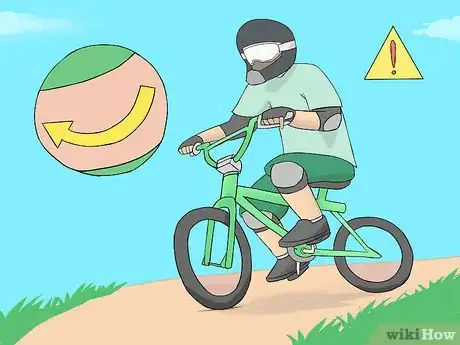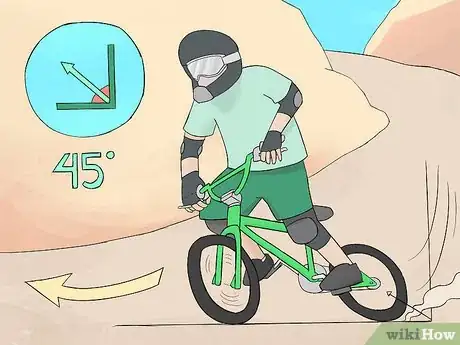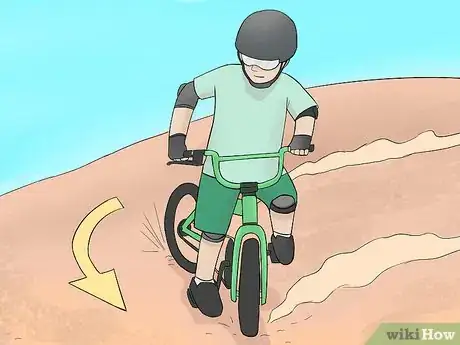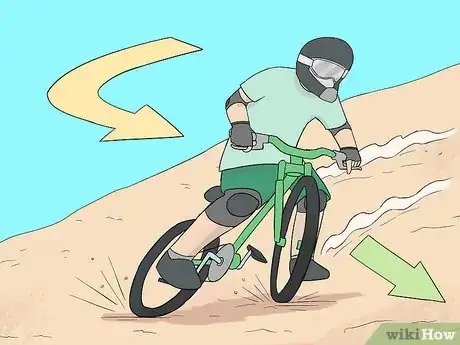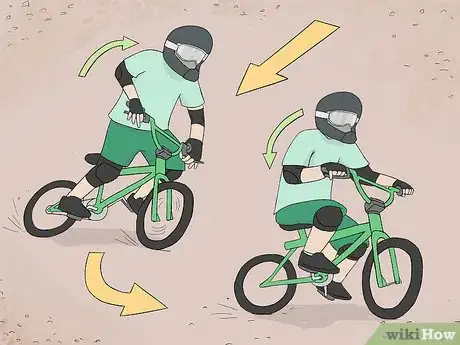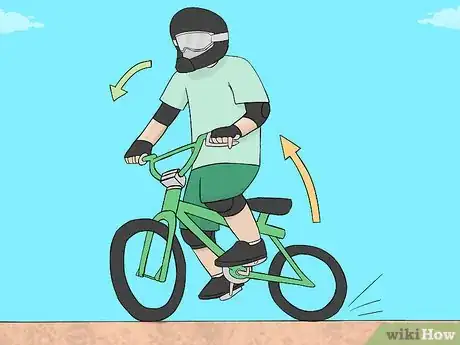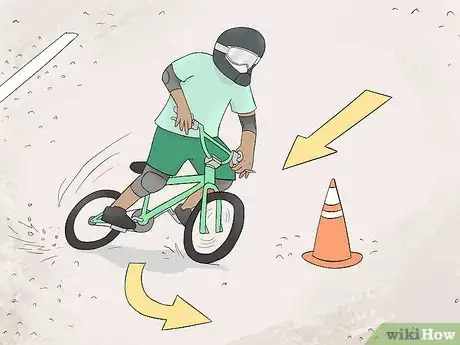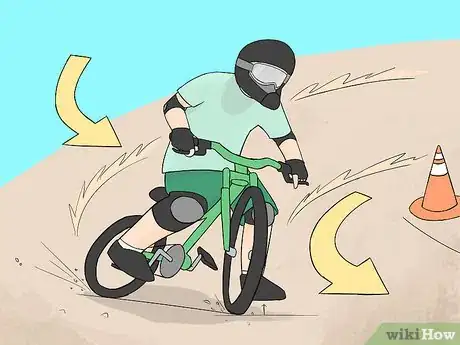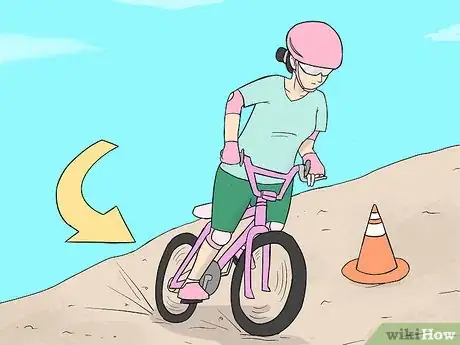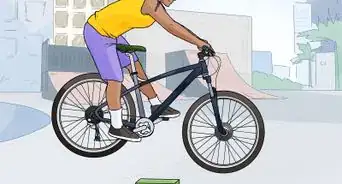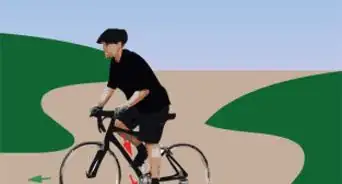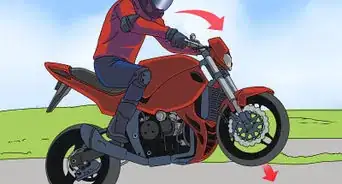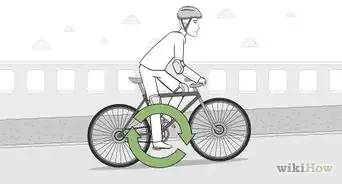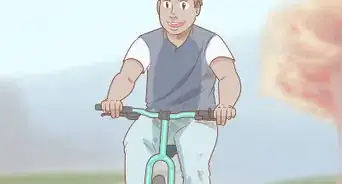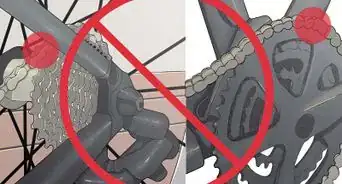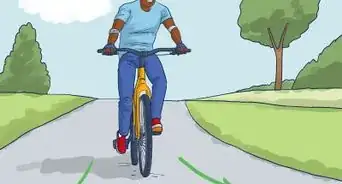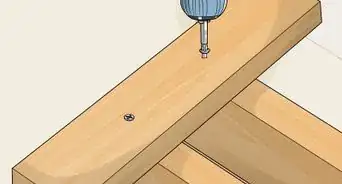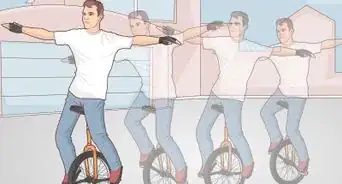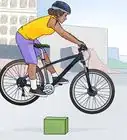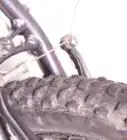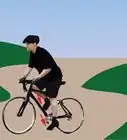This article was co-authored by Ikaika Cox and by wikiHow staff writer, Kyle Hall. Ikaika Cox is the Shop Director at the Salt Lake City branch Bicycle Collective in Salt Lake City, Utah. He has been a bike mechanic since 2012, beginning as a volunteer with the Provo Bicycle Collective, and growing and honing his skills as a bicycle mechanic and educator in multiple Bicycle Collective locations over the years. He now leads the Salt Lake City branch of the Bicycle Collective.
wikiHow marks an article as reader-approved once it receives enough positive feedback. In this case, 85% of readers who voted found the article helpful, earning it our reader-approved status.
This article has been viewed 264,660 times.
Drifting—also known as skidding when you’re doing it on a bike—is a technique where you approach a corner on your bike at a high speed and move around the turn as your back tire loses traction with the ground. To successfully skid around a corner, you should lean into the turn as you're going around it and shift your body weight forward. Skidding on a bike takes practice, but once you get the hang of it, you can use the technique to improve your speed and ride private downhill trails with ease.
Steps
Learning the Basic Motions
-
1Pedal quickly toward a turn. The faster you’re going when you get to the turn, the easier it will be to get your back tire to skid. Riding downhill toward a turn can help you pick up speed.[1]
Tip: Keep in mind that skidding can ruin trails, especially when they are wet. Avoid skidding on public trails. You might also want to volunteer with your local trail-building organization if you plan to skid.
-
2Lean in the direction of the turn once you reach it. Shift your body weight in the direction you’re turning so your body and bike are at about a 45-degree angle from the ground. Keep leaning as you go around the corner of the turn.[2]
- For example, if you’re taking a left turn, lean your body to the left.
Advertisement -
3Shift your weight forward as you go around the turn. To shift your weight, lean slightly forward over your handlebars. This will lighten the load on your back tire, which will let it skid off the ground. As you’re going around the turn, you should start to feel your back tire skidding outward. Gently press the rear brake if you need help getting the tire to break loose.[3]
-
4Extend your inside foot out so it’s hovering slightly above the ground. Your inside foot is your foot that’s closest to the inside corner of the turn. Continue to hold your foot out just above the ground as you go around the turn.[4]
- For example, if you’re taking a right turn, your right foot would be your inside foot.
- If you feel like you’re skidding out of control or your bike is going to spin out, plant your inside foot on the ground to stabilize yourself.
-
5Bring your body and bike upright again once you complete the turn. This will help your back tire regain traction after skidding. To bring yourself upright on your bike, stop leaning into the turn and pull your body weight up.[5]
Practicing Skidding
-
1Practice skidding at slower speeds first. Skidding is easier when you’re going faster, but higher speeds can increase your chances of wiping out. When you first start out, approach turns slowly and work on leaning into the turn and shifting your weight forward. Once you get the motions down, gradually increase your speed going into the turn.[6]
-
2Try skidding in a gravel parking lot before you practice on a trail. Use cones or another marker to indicate where you should turn in the parking lot. Then, pedal toward that spot and try to get your back tire to skid outward as you go around the turn. Practicing in a parking lot is safer than practicing on a downhill trail, and you won’t have to worry about damaging the trail.[7]
Tip: Remember, never skid on a public trail because it will ruin the trail for other users! Only skid on a trail if it is a private one that you own.
-
3Skid around wide, round turns when you’re starting out. Thin, sharp turns give you less room for error and less time to skid, so they're not the best to practice on. Look for turns that are round and wide so you have more time to work on your form as you go around them.[8]
-
4Be persistent. Skidding is an advanced biking move, and it can take a lot of practice to get it down. If you keep spinning out or your back tire isn’t skidding outward, try adjusting how much you’re leaning in and shifting your weight forward. You can even ask someone to film you practicing so you can see what your form looks like. Keep practicing and eventually you’ll get there!
Expert Q&A
Did you know you can get expert answers for this article?
Unlock expert answers by supporting wikiHow
-
QuestionDo this work with a fixed-gear bike? (Rear wheel brake)
 Ikaika CoxIkaika Cox is the Shop Director at the Salt Lake City branch Bicycle Collective in Salt Lake City, Utah. He has been a bike mechanic since 2012, beginning as a volunteer with the Provo Bicycle Collective, and growing and honing his skills as a bicycle mechanic and educator in multiple Bicycle Collective locations over the years. He now leads the Salt Lake City branch of the Bicycle Collective.
Ikaika CoxIkaika Cox is the Shop Director at the Salt Lake City branch Bicycle Collective in Salt Lake City, Utah. He has been a bike mechanic since 2012, beginning as a volunteer with the Provo Bicycle Collective, and growing and honing his skills as a bicycle mechanic and educator in multiple Bicycle Collective locations over the years. He now leads the Salt Lake City branch of the Bicycle Collective.
Bicycle Mechanic
-
QuestionCan I counter-steer on a bike? If so, how do I keep up with the steer?
 Ikaika CoxIkaika Cox is the Shop Director at the Salt Lake City branch Bicycle Collective in Salt Lake City, Utah. He has been a bike mechanic since 2012, beginning as a volunteer with the Provo Bicycle Collective, and growing and honing his skills as a bicycle mechanic and educator in multiple Bicycle Collective locations over the years. He now leads the Salt Lake City branch of the Bicycle Collective.
Ikaika CoxIkaika Cox is the Shop Director at the Salt Lake City branch Bicycle Collective in Salt Lake City, Utah. He has been a bike mechanic since 2012, beginning as a volunteer with the Provo Bicycle Collective, and growing and honing his skills as a bicycle mechanic and educator in multiple Bicycle Collective locations over the years. He now leads the Salt Lake City branch of the Bicycle Collective.
Bicycle Mechanic
-
QuestionHow do you get that perfect Tokyo drift?
 Community AnswerLock up around a bend and control it with the opposite lock. Also the more speed, the longer the drift, but not too much speed. The surface along with the tires you're using will effect your drift.
Community AnswerLock up around a bend and control it with the opposite lock. Also the more speed, the longer the drift, but not too much speed. The surface along with the tires you're using will effect your drift.
Warnings
- Always wear a helmet when you’re riding a bike.⧼thumbs_response⧽
References
- ↑ https://www.bicycling.com/training/skills/art-drifting-around-corners
- ↑ https://www.youtube.com/watch?v=luY8tB1xk4I&feature=youtu.be
- ↑ https://www.bicycling.com/training/skills/art-drifting-around-corners
- ↑ https://www.bicycling.com/training/skills/art-drifting-around-corners
- ↑ https://www.youtube.com/watch?v=luY8tB1xk4I&feature=youtu.be&t=140
- ↑ https://www.tetongravity.com/story/bike/drift-your-bike-like-a-boss-with-steve-smith
- ↑ https://www.tetongravity.com/story/bike/drift-your-bike-like-a-boss-with-steve-smith
- ↑ https://www.bicycling.com/training/skills/art-drifting-around-corners
